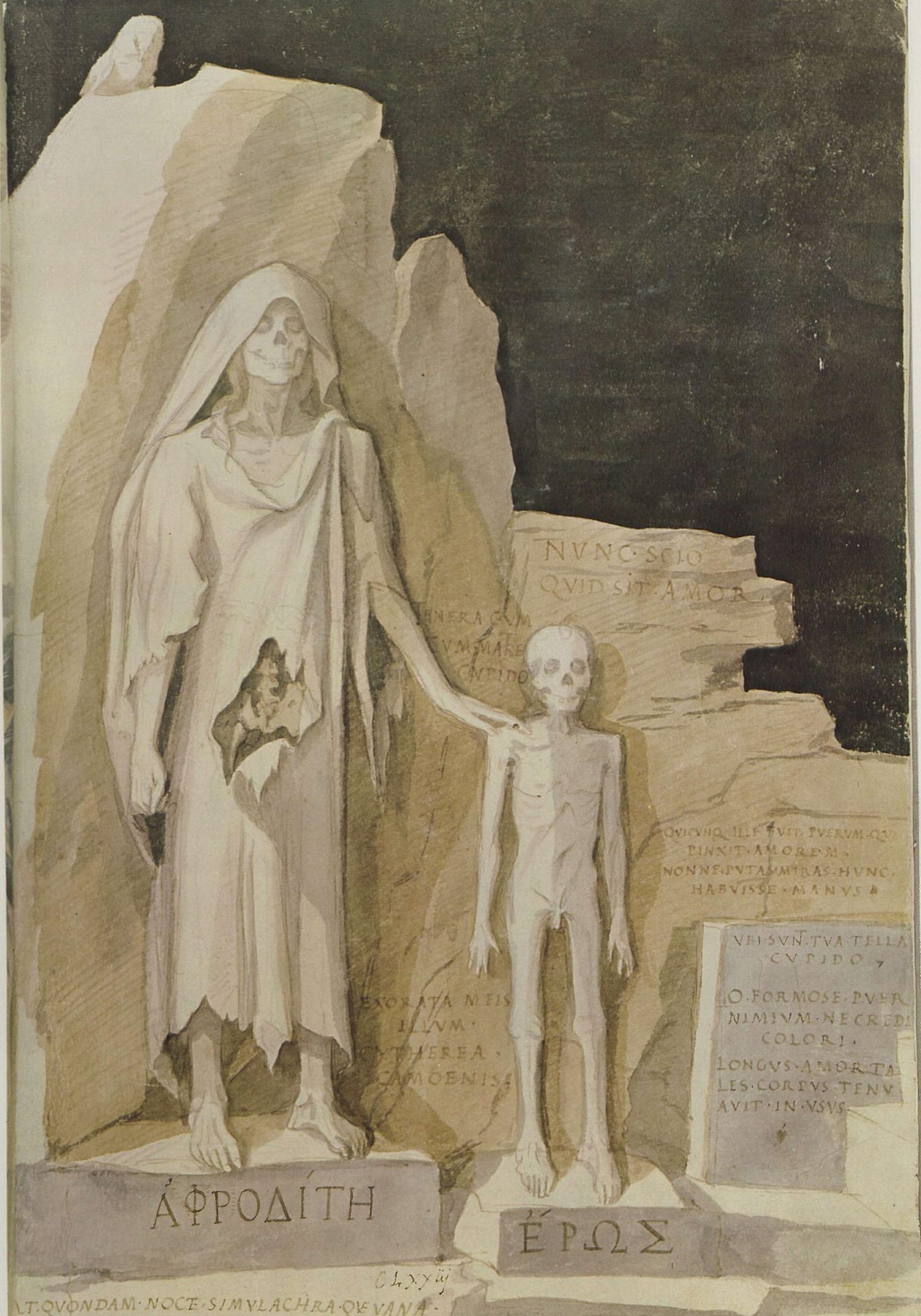Translation: The Ash I'll Be Will Not Forget Our Love
Propertius' (ca. 45 - 15 BCE) lyrical aria on a love that endures beyond the grave
Propertius was obsessed by ghosts—“Ghosts do exist” is how one of his greatest poems begins (Sunt aliquid Manes, 4.7). The ghost in question, that of his beloved Cynthia, goes on to accuse him bitterly of many things, including skipping her exequies—ironically, since he is forever imagining his own and giving her instructions about it. Propertius is an imperious director of his own funeral. In one poem (2.13), he demands a simple ceremony, without ostentation—no wax masks or trumpets or ivory or gold. In another (3.16) he begs Cynthia not to bury him along a busy street. Sometimes, evidently in the midst of a quarrel, he imagines her desecrating his grave:
Die then, Propertius, that will bring her joy:
she’ll haunt your ghost, insult your eidolon,
piss on your pyre, kick your skeleton. [2.8 ll. 18-20]
Usually, though, he craves more pious observances, signs that the love she professed in life was real, and intimates that he will be keeping tabs:
See that you don’t offend my dust. Beware:
the earth knows what it knows, and truth is there. [2.13 ll. 41-2]
Nowhere, however, does he state more powerfully his sense, or perhaps hope, that love will continue to haunt him beyond the grave, than in this poem, elegy I.19:
Non ego nunc tristis vereor, mea Cynthia, Manes,
nec moror extremo debita fata rogo;
sed ne forte tuo careat mihi funus amore,
hic timor est ipsis durior exsequiis.
non adeo leviter nostris puer haesit ocellis, 5
ut meus oblito pulvis amore vacet.
illic Phylacides iucundae coniugis heros
non potuit caecis immemor esse locis,
sed cupidus falsis attingere gaudia palmis
Thessalis antiquam venerat umbra domum. 10
illic quidquid ero, semper tua dicar imago:
traicit et fati litora magnus amor.
illic formosae veniant chorus heroinae,
quas dedit Argivis Dardana praeda viris:
quarum nulla tua fuerit mihi, Cynthia, forma 15
gratior et (Tellus hoc ita iusta sinat)
quamvis te longae remorentur fata senectae,
cara tamen lacrimis ossa futura meis.
quae tu viva mea possis sentire favilla!
tum mihi non ullo mors sit amara loco. 20
quam vereor, ne te contempto, Cynthia, busto
abstrahat a nostro pulvere iniquus Amor,
cogat et invitam lacrimas siccare cadentis!
flectitur assiduis certa puella minis.
quare, dum licet, inter nos laetemur amantes: 25
non satis est ullo tempore longus amor.
Cynthia, I do not fear the gods below,
or balk to give the pyre what I owe,
but if you won’t attend my funeral…
that scares me more than even death and hell.
He’s not a joke, the boy I’m victim of:
the ash I’ll be will not forget our love.
Protesilaus’ wife, amidst the blind
realms of oblivion, still gripped his mind:
desperate to clasp his bliss with spectral fingers,
at his old home in Thessaly, he lingers. 10
Whatever else I’ll be there, I’ll be yours.
Great love gains even those far, fatal shores.
There, should I meet each legendary beauty
whom Troy’s sack gave Greek conquerors as booty,
none of them, Cynthia, could please me more
than you, and—this is what I’m praying for!—
should old age keep you from me many years,
your bones will still be holy to my tears.
If you, in life, could sense my ash was sad,
then death, no matter where, would not be bad. 20
But I’m afraid indifferent Love will keep
you far from my scorned pyre and ash-heap,
and make you dry your tears against your will.
Even a true heart is corruptible.
Therefore let’s clasp our love with all our strength—
true love’s not long enough at any length.
--Propertius I.19





